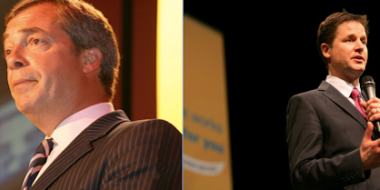Chris Gilson, Danielle Moran, and Amy Mollett take a look at the week in political blogging.
The eurozone crisis
Jon Snow ponders the danger hovering over the eurozone and Faisal Islam writes that democracy and growth are being choked by this crisis. The Staggers advises David Cameron to start cosying up to Angela Merkel as thetorydiary notes that voters are two-to-one against any backdoor UK bailout. The Coffee House fears that Britain is becoming a pariah on the continent, while Tony Burke – blogging at Left Foot Forward – reminds us why Europe has a positive role to play. David Herdson at politicalbetting.com thinks that the EU crisis is UKIP’s moment to become more prominent, but reckons they may be wasting the opportunity.
The UK economy
Liberal Conspiracy provides a point-by-point rebuttal of the Adam Smith Institute’s recent attack on the Robin Hood Tax and Left Foot Forward notes that government’s plans to push unemployed people into work will see participants paid £1.78 an hour. The FT’s Westminster Blog weighs up how much each benefit costs, and thetorydiary outlines how Osborne’s debt reduction strategy has saved £16.5 billion in interest payments.
The Green Benches discusses poverty in the UK, and dedicates the post to Martin and Helen Mullins.
Theresa May’s border blunders
Political Scrapbook unearths an exchange from 2004 in which Theresa May told a Labour minister to resign over an immigration scandal. Paul Goodman at thetorydiary writes that the May’s current problems demonstrate what can happen when plans to reduce the deficit and control the UK’s borders grind against each other. The Staggers covers the fury projected at May from within her own party and Left Foot Forward notes the FT’s disgust at the Home Secretary’s ‘preference for popular pandering over rational policy’.
NHS privatization
Pete Jefferys, writing for Open Democracy, argues that the co-operative movement will suffer greatly from news that private firms will take over NHS hospitals, and the False Economy blog questions how Circle intend to turn a profit on the company’s new venture. Richard Murphy believes that the Tories are turning the NHS into the National Heist Service, and Paul Waugh chronicles the Liberal Democrats’ attempts to distance themselves from the unpopular aspects of Andrew Lansley’s plans.
The parties
As the Scottish Conservatives poll for a new party leader over the weekend, Dale & Co’s Nik Darlington discusses the future for Tories north of the border. Tim Montgomerie at thetorydiary looks at how Iain Duncan Smith is finding common ground with the Liberal Democrats over family policies. Politicalbetting.com examines which leader might bear the greatest amount of political fallout if the economy slips into recession next year.
Peter Watt, writing for Labour Uncut, warns the party not to shout at the Tories but Dan Hodges is convinced that Labour need to bring out the attack dogs and stop being so nice. Labour List wonders what party stands for when ‘there’s no money left’. Left Foot Forward rounds up the tributes to Philip Gould, architect of New Labour, who passed away this week, and James Morris at the Huffington Post pays tribute to his legacy by outlining why polling is good for democracy.
Poppy politics
Luke Denne at Liberal Conspiracy urges us to reclaim the poppy as a symbol of peace, not war, and Guy Walters in the New Statesman calls time on public displays of care.
Occupy London
Owen Jones at The Staggers says that Ed Miliband’s words in support of Occupy LSX represent a victory for the movement.
And finally…
The coalition’s claim to be the greenest government ever takes another hit as 11,000 solar job layoffs are announced, and Leo Hickman at the Guardian’s Environment Blog wonders whether climate scepticism is largely an Anglo-Saxon phenomenon.
The Coffee House argues that James Murdoch escaped a forensic examination at the Commons culture committee thanks to Tom Watson’s talk of the mafia.
Carol Quilliam at Liberal Democrat Voice muses on whether or not it is time to ban political advertising on TV.
Laurie Penny is not convinced that the proposed changes to royal succession are a modernisation of the monarchy.







